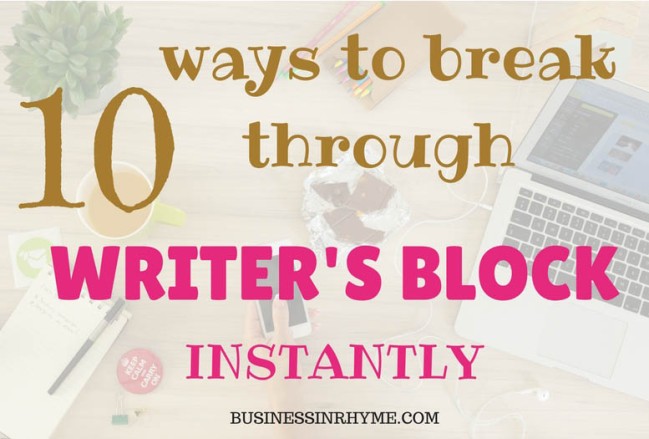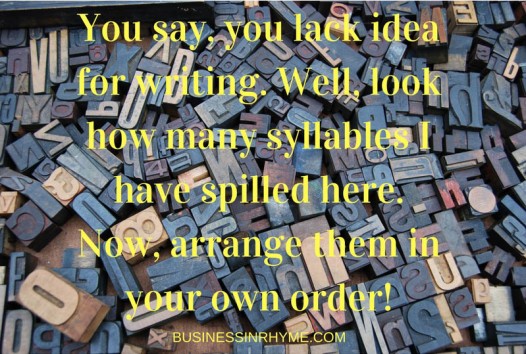Writer’s block: a detrimental feeling that many of us encounter at least once in our writing life when you simply can’t pull yourself together and produce some satisfying work – at least in your own eyes. You feel lack of inspiration, like you have nothing to say and your imagination simply doesn’t exist.
But let’s think about it for a second – who is actually ‘blocking’ us in writing? Is there a concrete block standing on your keyboard, preventing you to type? Who is making us feel that our ideas are not worthy, that we are not creative? We are. We are the only ones standing as an obstacle to our creating.
And though this term is very popular, a modern notion coined in 1947 by Dr Edmund Bergler, a famous Austrian psychiatrist, I don’t truly believe in writer’s block.
I believe that we often fall in monotony, where we are caught by inertia – just like in a river stream. We might find ourselves in yellow, muddy waters and if we long for fresh, clear flow of ideas – we need to swim, move, get out of or change the conditions that clog our thinking.
One thing that years of writing taught me is that you can’t force it. It’s like pedaling upstream – you soon get tired, out of breath and strength, but you haven’t actually made any progress.
Better way than forcing your writing is provoking your writing. This is where your power and control lies. There are many ways you can stir up your imagination and here I will share some of the practices I use to find my way to writing:
1.When you struggle with writing, do something completely the opposite.
I have noticed when I’m not completely in my ‘writing mode’, leaving that aside and doing other activities that are on my TO DO list can be enough to jumpstart my inspiration. This maybe due to subconscious feeling of worry are we going to do everything planed for that day: simply giving us time again for writing when you have the feeling you’ve accomplished your objectives for the day, can be enough for a productive writing session.
2.Free write for 10 minutes to get rid of monotony
Just write without thinking. How you progress, new and exciting ideas will start to appear. Give yourself a chance to play with words and enjoy – you will much more appreciate your writing and the creative process. Here on the blog are many creative exercises you use can as a prompts and inspiration pointers to instantly break any writing barrier.
3.Research
This might be more applicable to non-fiction writing, but anytime I’m not focused or I have maybe to many ideas, I perform a research on the similar subject. I find this to be very beneficial in terms that similar work I encounter can serve as a guidance on which topic to write or not – or give my own opinion on something that is stereotyped and could use a new input. Getting insight on what other people are doing on similar topic is always helpful.
4.Indulge in some art
Listen to some music or visit art exhibition – I have found this to be one of the most helpful ways for me. By listening to my favorite bands or just looking at some of the De Chirico paintings as an instant recentering for me. On Pinterest I have even a board ‘Surrealism’ which I often use as my favorite muse.
5.Limit yourself
Set some rules: Start with what if clause or focus on using specific words. It has been shown that limited creative freedom can have a positive impact on generating new ideas as it provokes you to think differently.
6.Leave unfinished sentence
This is fun and clever thing to do. You just leave out there a word to linger and next time you have to deal with it – it will hang on the tip of your tongue, tickle until you figure out what to write!
7.Return to your favorite authors, phrases, quotes that you like
Lately I have been writing, by hand in separate notebook poems and quotes that I like. It helps me with that feeling of insecurity sometimes I have about my writing. A simple encouragement that you can give yourself and easily destroys doubts is reading and believing in words of your favorite authors.
8.Go on a date with yourself
As said in the beginning, we are the only ones blocking ourselves in doing what we love. And why does it happen? Maybe it’s a message, a sign that we need rest, that we need more attention and time to be kind towards ourselves, destress and restore creative energy. So make room in your schedule to spend time with yourself, doing what makes you feel good -pamper yourself. Your creativity will come rushing back to your arms, making you eager to write again.
9.Do some squats or go for a walk
Physical exercise makes your heart beat faster, supplying your brain with oxygen. It helps with brain fog we sometimes experiences and your thinking becomes clearer. Going for a walk helps with your senses where change of scenery offers insights to new possibilities and opportunities.
10.If nothing else works – eat some chocolate!
But not any chocolate – with at least of 75% of cocoa, as some researches have found that consumption of cocoa flavanols results in an acute improvement in visual and cognitive function, giving your brain more power to deal with difficult tasks. So eat your way through writer’s block 😉
If you liked this post and you are interested in getting more inspiration for your creativity, writing and personal growth, sign up for our free monthly newsletter. For additional tips, follow us on twitter and connect with us on facebook.



